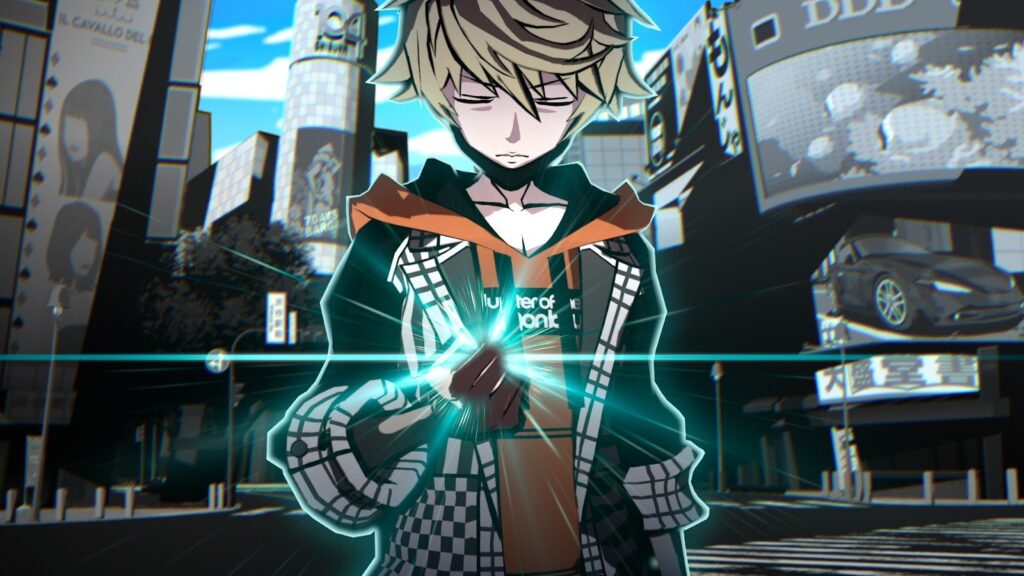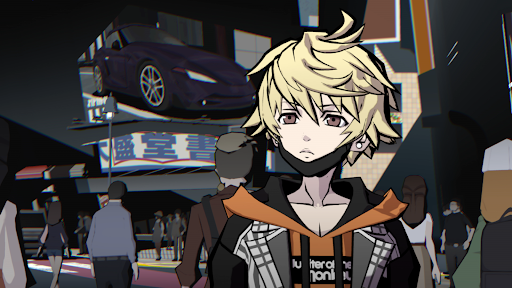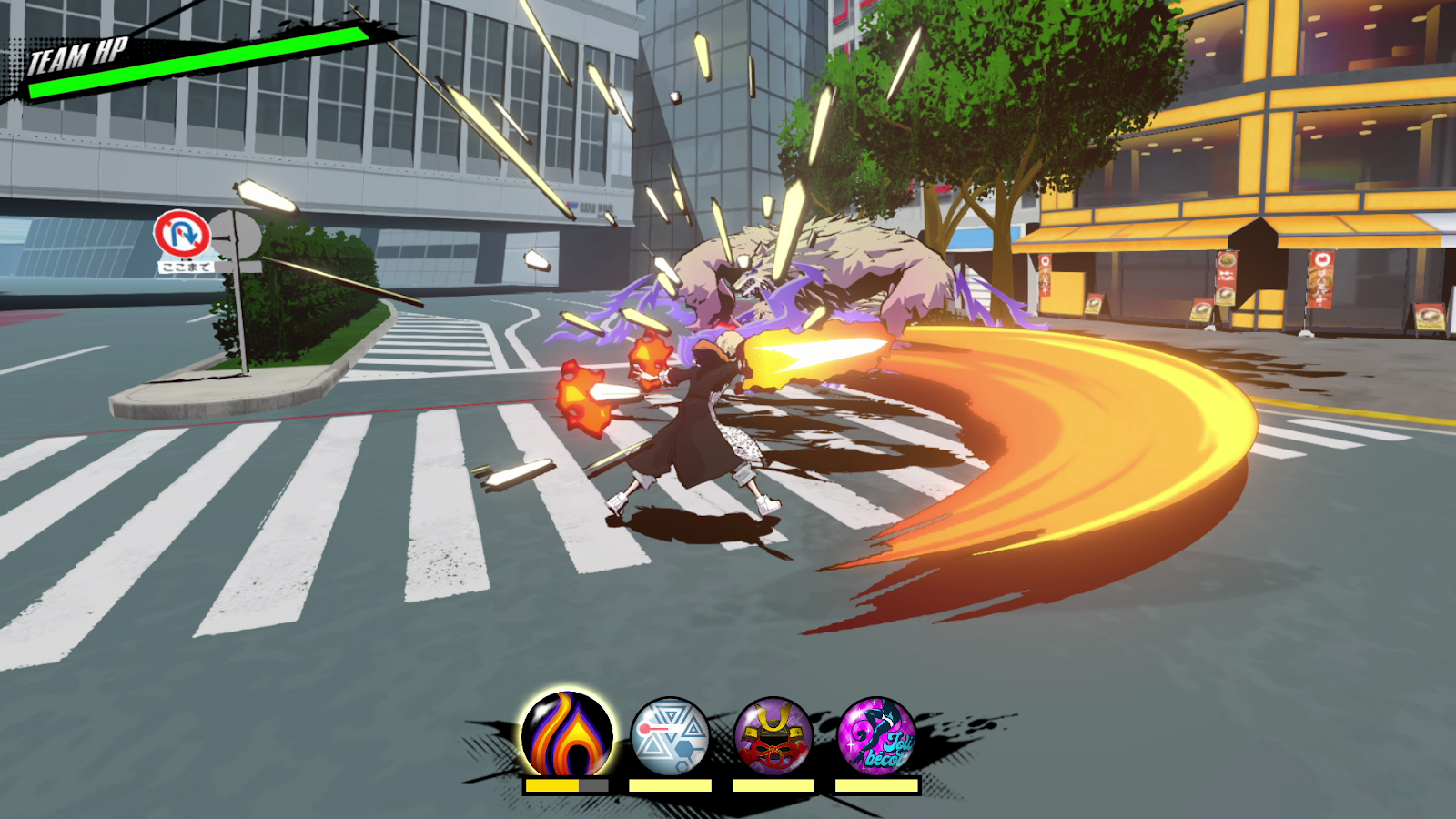
This week, after years of anticipation, NEO: The World Ends WIth You released to a public clamouring for a follow-up to 2007’s cult classic JRPG. Reviews for the game have been largely positive, with some reviewers calling out the game’s strong cast of characters.
When it comes to bringing a character to life, voice actors shoulder much of the burden. It’s through them that we receive all the emotion felt by the protagonists. As such, it may be surprising to learn that Paul Castro Jr., the English voice for Rindo, the main character of NEO: The World Ends With You, is new to the world of video game voice acting.
Before being cast as Rindo, Castro made his name performing voiceovers in commercials for companies such as Dunkin’ Donuts and AT&T. The world of video games is much different than advertising, though, and GameDaily reached out to Castro to learn all about his process, the transition to games, and more. During our conversation, he detailed his process, what auditioning was like, the importance of connections, how Rindo was an interesting character to portray, and how he stands out among a sea of voice acting talent.
GameDaily: What have been your favorite roles in your career so far?
Paul Castro Jr.: Oh, boy! My favorite roles I mean, I have to say Rindo is definitely on the top; it’s also very recent so I can obviously remember it the most clearly. From obviously NEO The World Ends With You, he was a fun character. It was a fun journey to play [him]. I’m a huge fan of Square Enix games. I think that they are one of the best world creators and writers, especially when I was a teenage kid. All of those optimistic or angsty even protagonists, I always resonated with. I always saw myself in Cloud, in Sora, in Tidus, in Zidane, and probably I saw myself more in Zell than Squall. But, you know, all of the square characters, I always saw myself kind of in a reflection, so Rindo kind of fits that same mold. It’s like a reflection of who I was a bit at that age.

GD: What do you see in yourself in Rindo?
PCJ: Without getting too deep into it, he is obsessed with technology, like he’s always on his phone playing “Fan Go,” which is like a Pokemon Go where you’re collecting different things. And that’s absolutely something that I would be doing. And he’s also kind of like a go-with-the-flow kind of guy. And I always felt that that’s how I was growing up. I never was the first to jump towards anything. But I also would get involved. If I found myself somehow in the middle of a disaster, I’d be helping people out, I would, you know, whatever it was, I would definitely be called to action. But I’m not looking for trouble. That’s definitely how I would say how I resonate the most with him.
GD: Tell us more about your character Rindo. What makes him an interesting character to portray?
PCJ: I would say what makes him interesting is that he seems like a very real adolescent kid. And rather than it being like a caricature of what a teenager might be, or kind of a stereotype of what like, you know, kids from 12 to 18 years old are doing you know, it’s not like the obsessive Fortnite obnoxious personality I’d say, he seems like a very genuine, three dimensional, real teen. And that was interesting for me to not have to lean into anything that’s too outlandish or quirky or unbelievable. I felt that everything was coming from like a real genuine place, and it all made sense. So that was really fun.
GD: Do you think it’s interesting to play a realistic kind of character in a ridiculous world?
PCJ: That’s a funny way of looking at it. I think as an outside perspective, like not being an actor, like a third party, that would seem a bit bizarre.
“You know, as an actor, you just create different associations for things, you know, the same way there might be dragons flying In Game of Thrones, you can imagine another scenario for what’s going on for another character. Maybe it’s not dragons, maybe it’s, you know, COVID-19 or something, you have to figure out another way of having that similar fear, or anxiety, whatever it might be. So, from the outside perspective, definitely a bit bizarre, but as an actor, you find your tricks to kind of make it seem realistic.”
GD: What kind of resources did Square give you during the process? And did you do any research on Shibuya or Tokyo?
PCJ: I knew a fair amount from playing the first game before…playing the Persona games, and just being very interested in Japanese culture and studying the Japanese language. In terms of what they gave me, it wasn’t a lot. I’m not going to go into details that were shared yet, but we definitely got a reference for the Japanese, so we had a guideline to what to make our characters sound like based off of the Japanese reference, which is already recorded.
GD: During the audition process, did they give you a picture, like the concept of Rindo? And then they asked you to make a voice out of his personality?
PCJ: Kinda, yeah. They gave me one picture of each character. And there was a blurb obviously written on them. And they sometimes say, [they’re] like this person, or like a certain character, another actor, or another character that exists in the world, something like that. Between the Japanese reference, the picture, and the blurb, they gave us some of the character background. I had quite a bit I think to work with. It’s more than sometimes you get for other things. Sometimes you just read a script and a line. [They say] this guy is a thief. You know, that’s all you get and the palate is wide open.
GD: How do you stand out during the audition process? Do you add any improvised elements to it? What’s your process?
PCJ: I do [improvise] oftentimes, in auditions. I do a lot of improv. I always try to improv when I can. Certain people don’t like it, certain casting directors or studios, they like to just stick to the script…For things that are particularly anime or video games where you’re working off of a reference track, there’s not really room to improv, but what I did in terms of making it unique to myself was I leaned on the way that I would do it, if it was me in that scenario with a couple of the traits that Rindo had.
I think where you see a lot of beginner actors fall into a trap is they try to do what they think they want. So like, if there’s certain adjectives like angsty, or bombastic. or energetic, they hear that word, and they instantly play into that, whereas you can find out the way that you in that scenario might be energetic. And it might not be a 10, it might be a five instead…Sometimes people see an exclamation point, and they think it’s gonna be a shout, it’s gonna be screams, it’s gonna be high energy. But that exclamation point could be [more subtle]. That could be an exclamation point. So there’s many different levels you can play. I always fall back to the way I would do it. Because that’s the most unique thing that I can do. Everybody else can play into certain stereotypes. Nobody knows how Paul Castro Jr. would do it.

GD: Automated dialog replacement (ADR) can add to that challenge, right, as it’s a process that has you matching the lip patterns with the Japanese dub and animation.
PCJ: Again, I think that’s another reason that dub doesn’t get more credit because the Japanese get to perform. Oftentimes, they’re performing on stage with other cast members doing the whole script. So they have the freedom to use a bit more of their body to to dirty up the takes, so to speak, and create an authentic performance. Then the American or the English or whatever other foreign languages [dub into that.] We have to match [the Japanese performance], getting that same emotional state that person got, when they were working off their cast members, building up to a certain point in the story. We have to get there like that. You know, when you see good dub performances, that’s an actor who’s able to tap into emotions and create associations with things instantly and cleverly. I think it’s really profound when you see an actor who is able to do it really well. And there’s quite a few of them that are able to, you know, you look at someone like Bryce Papenbrook, who’s been doing this for a long time, he can get to those places really great and someone who I definitely look up to.
GD: The voice acting industry is a competitive space with plenty of talent out there like Bryce Papenbrook, Troy Baker, and Yuri Lowenthal. How do you market yourself to stand out among the rest?
PCJ: Well, it’s funny because we’re talking about Bryce and Yuri, and specifically in voiceover, you have these people who’ve been doing this for 20 years that can still play 16-year-old characters. You enter the fray as a new voiceover actor, and the auditions you’re getting, you’re more than likely going up against Bryce, Yuri, Troy, all these juggernauts in the industry. I wouldn’t be surprised if there are some top talent who auditioned for Rindo.
“So from the second you start auditioning as a professional, you’re up against the best. And you need to really figure out what makes you unique.”
They’ve got the guy who can, you know, Bryce can play every young protagonist if he really wants, they can get him to do any protagonist they want. But the reason why I feel like I get hired, and other people get hired, who are new, is that there’s something different about [us]. It’s cadence, it’s tone, it’s intonation, it’s different values, different passions, a unique history that’s behind all the acting, you know, my life and my life experiences make me look at a script way differently than somebody else would. So I have to trust those instincts that I’ve had, and the history that I’ve built up in my life is going to be the thing that separates me.
GD: That’s fascinating. I’ve never thought about it like that before. I guess you also have to connect with other voice actors, despite them being your competition as well. It’s kind of an interesting relationship, right?
PCJ: Yeah,you have to look at this industry as a relay race because if you think of it as a sprint, or every person for themself, you’re going to miss out on so many opportunities, especially in voiceover. Notoriously, there’s been scenarios where voice actors have been called in for projects, they’re not right for the role, and they go “you know what, I’m not right for this, you might want to call up this person.” A lot of voice actors who’ve moved from being just talent to being the ADR directors, or being the script translators and adapters, working closely with the casting director, some voice actors also start doing casting or new directors and producers are asking other actors for like”hey, I love working with you. We vibe really well. You must know people that are cool and trustworthy. Can you recommend them?” It happens all the time. So, how do you connect with people who are professionally on a way different tier than you? You gotta find a way to make your own path, make yourself unique whether that’s making your own YouTube channel skits, making random videos on TikTok, making your own animated series that you’re pitching to networks, you know, any way to carve your own path and make yourself valuable.
GD: You were talking about your throat and how it’s kind of hurting at this moment. Sorry for making you chat so much today.
PCJ: No, no, no, it’s great!
GD: How do you protect your throat from these extensive VO sessions?
PCJ: You have to be your own biggest advocate, nobody is going to look out for you more than you. So, sometimes you’ll work with studios, or new producers, or directors, or creatives who don’t really understand a performer’s anatomy and the body [that is] our temple we need to make our living. You need to know when to stop and speak up for yourself and say, “hey, I need to break here. for five minutes, I need to go take a tea break, I need to do straw phonation which is when you blow into a straw.” [Straw phonation] is great for your voice, it opens up your vocal cords, gets them vibrating at the same speed again. [But] you have to speak up for yourself, you need to make sure you’re warming up prior to sessions and warming down when you’re done.
Going on vocal rest [is also important], when you know you’ve got a big session coming up or [you’re] in between things, thankfully, I finished my big session yesterday. Video games and anime particularly require a lot of those big yells, and screams, and death rattles, and you know, it’s a lot of combat stuff. So that’s where you really need to be prepared to have good stamina, you need to have practiced it safely, not use your throat, and work as much as you can from your diaphragm. [You] don’t strain your muscles, because you know when you’re doing those big yells and screams, you start tensing up your neck and your back and your shoulders. [If] you do that for 30 minutes, you’re gonna have tremendous headaches and migraines. And you’ve got three and a half hours of a session left to go. So how can you pace yourself? Be as loose as possible in your body. And that takes a lot of practice, you know, downloading scripts on your own, figuring out ways to practice these things before you get the job so that you know that you are equipped to do it, and they don’t have to recast you.

GD: Why should people play Neo: The World Ends With You?
If you never played the first game, an anime just came out that can break down that whole story in you know, I think it’s like 12 episodes, so you shouldn’t feel intimidated by jumping into a franchise if you haven’t played the first game, you can watch the anime.
[With] this game, I think there is such a unique and colorful cast of characters, all tremendous voice talent, tremendous writing in this story, there’s going to be twists and turns that are going to make your heart flutter and all these different things. I think there’s just something for everybody here. And from the design of the game, the combat, the music, the characters, the fact that it’s a returning game from 14 years based off of the love and passion of a small dedicated community…there’s a reason why this game is coming back.
NEO: The World Ends With You is out now on the Nintendo Switch, PS4, and PS5 (backwards compatible). A PC release is also slated, but no official release date has been given for the port yet.
 GameDaily.biz © 2026 | All Rights Reserved.
GameDaily.biz © 2026 | All Rights Reserved.